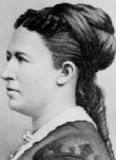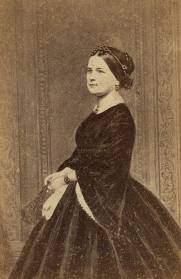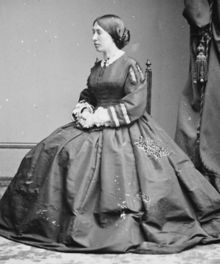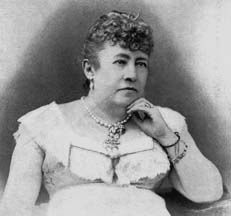 Grant’s Soul Mate, Julia Dent Grant, was the General’s steadfast and Devoted Wife and the loving Mother of his four children. Although best known as a general’s wife and a first lady, Julia Dent Grant left an important legacy in her own right. She shared in the mixed fortunes of Ulysses S. Grant, promoted her husband’s welfare, served her family, and fulfilled her patriotic duty. Short, rather stocky, with dark hair and brown eyes, a prominent nose and a cast in one eye that gave Julia a determined look. The cast caused her to be “wall-eyed”; that is, to see one object and another at the same time. Never a pretty woman, some called her plain, but she had a sparkle, charm and a ready smile that lightened her rather heavy features. Julia Grant tended to portray her childhood as something out of a dream and her marriage to Ulysses S. Grant would deliver all the romance and adventure she could ever have wanted, even though she would have to suffer loneliness and hardship along the way.
Grant’s Soul Mate, Julia Dent Grant, was the General’s steadfast and Devoted Wife and the loving Mother of his four children. Although best known as a general’s wife and a first lady, Julia Dent Grant left an important legacy in her own right. She shared in the mixed fortunes of Ulysses S. Grant, promoted her husband’s welfare, served her family, and fulfilled her patriotic duty. Short, rather stocky, with dark hair and brown eyes, a prominent nose and a cast in one eye that gave Julia a determined look. The cast caused her to be “wall-eyed”; that is, to see one object and another at the same time. Never a pretty woman, some called her plain, but she had a sparkle, charm and a ready smile that lightened her rather heavy features. Julia Grant tended to portray her childhood as something out of a dream and her marriage to Ulysses S. Grant would deliver all the romance and adventure she could ever have wanted, even though she would have to suffer loneliness and hardship along the way.
 Julia Dent was born in St. Louis, Missouri, on January 26, 1826, the daughter of “Colonel” Frederick and Ellen Wrenshall Dent. Julia, the fifth of seven children and the first girl, grew up at White Haven, the family farm and estate, where she fished, rode horseback, and played in the woods. As a schoolgirl she declared that she would marry “a soldier, a gallant, brave, dashing soldier.” Julia’s mother came from a cultured background. Because of this, she made sure all of her children, even the girls, were educated. Julia grew up in wealth and was educated at the local school run by John F. Long. She did well, except for Roman numerals. Later she attended the Mauro Boarding School for seven years, where she enjoyed literature but disliked mathematics. After returning home in 1844, she met the young Lieutenant Ulysses S. Grant, who was stationed at the nearby Jefferson Barracks. He was a classmate of Julia’s brother, Frederick Dent, and became an admirer of Julia’s. Invited to White Haven by her brother, who had been Grant’s West Point roommate, Ulysses became a frequent visitor. He and Julia enjoyed walks and horseback rides, often dodging her siblings and slaves to be alone.
Julia Dent was born in St. Louis, Missouri, on January 26, 1826, the daughter of “Colonel” Frederick and Ellen Wrenshall Dent. Julia, the fifth of seven children and the first girl, grew up at White Haven, the family farm and estate, where she fished, rode horseback, and played in the woods. As a schoolgirl she declared that she would marry “a soldier, a gallant, brave, dashing soldier.” Julia’s mother came from a cultured background. Because of this, she made sure all of her children, even the girls, were educated. Julia grew up in wealth and was educated at the local school run by John F. Long. She did well, except for Roman numerals. Later she attended the Mauro Boarding School for seven years, where she enjoyed literature but disliked mathematics. After returning home in 1844, she met the young Lieutenant Ulysses S. Grant, who was stationed at the nearby Jefferson Barracks. He was a classmate of Julia’s brother, Frederick Dent, and became an admirer of Julia’s. Invited to White Haven by her brother, who had been Grant’s West Point roommate, Ulysses became a frequent visitor. He and Julia enjoyed walks and horseback rides, often dodging her siblings and slaves to be alone.
After just four months of courtship, “Ulys,” as Julia called him, proposed marriage, and Julia accepted. For a year, the two kept their engagement a secret, but in 1845 Ulysses officially asked Colonel Dent for his daughter’s hand. The Colonel approved the match, but the wedding had to wait. Trouble was brewing on the U.S. Mexican border. Soon, Ulysses S. Grant, would be fighting in his first war. At the successful conclusion of the Mexican War, the young couple was married on August 22, 1848. Among Grant’s attendants was James Longstreet of Civil War fame, who was also Julia’s cousin.
Julia was extremely devoted to her husband and family, and he to them. But it was not an easy life. They were separated for two years when Ulysses was stationed on the Pacific Coast. Although he had been put in command of infantry divisions, he was forced to resign for insubordination. Grant returned home in 1854, and then failed at everything he tried to do. Julia’s father gave them land to build a house and farm; called “Hardscrabble.”
They didn’t have much success farming, and the Panic of 1857 financially ruined it. White Haven also failed. Ulysses tried working as a rent collector, but failed at that, too. By 1860, they had moved to Galena, Illinois, where Ulysses worked at his father’s harness and tanning business. Then the Civil War began and changed everything.
As it did for most Americans, the Civil War dramatically altered the Grants’ lives. In 1861 Ulysses immediately left to serve in the Union army, and his responsibilities kept him away from home for most of the war. Letters helped to ease the pain of separation, and Julia frequently traveled to her husband’s encampments, both alone and with the children. It is ironic to note that her slave, Jule, usually assisted with the children’s care on such trips. The family’s presence seemed to have a stabilizing influence upon Grant. With a strong desire to contribute to the war effort, Julia became a trusted confidant, and often offered suggestions, such as inviting President and First Lady Lincoln to visit them at the front.
 Julia Grant, five years before her death, told of she and the General’s correspondence during the Civil War,
Julia Grant, five years before her death, told of she and the General’s correspondence during the Civil War,
“The General never talked war matters with me at all. He wrote very little about the war, even after the taking of Vicksburg. I don’t remember that he wrote me any letter of exultation of joy. He was so sorry for the poor fellows who were opposed to him that he never could exult over any victory. He always felt relieved, of course, and glad that it seemed to promise to shorten the war, but he never exulted over them.”
When Julia Grant was boarding in Nashville and visiting the wounded at the hospital, she tried to share with her husband the trials and tribulations of the soldiers and was stopped by the General, abruptly stating,
“Now, my dear, I don’t want to hear anything at all about that. I don’t want you to come to me with any of these tales of the hospitals or any of these petitions or messages. I have all I can bear up under outside my home and when I come to you I want to see you and the children and talk about other matters. I want to get all the sunshine I can.”
When Grant was named Commander of all the Union forces in 1864, Julia found herself the center of attention, something she grew to love. The war’s end, Lincoln’s assassination and the turmoil afterwards, propelled the Grants into the spotlight. Given gifts, honors and even a house in Galena, the years after the war brought fame and prosperity to the Grants and his election to the presidency in 1868 was a certainty
Julia Grant would be the first First Lady to serve 8 full years since Elizabeth Monroe. With the help of the socially prominent wife of the Secretary of State, Julia Fish, Mrs. Grant made her way through the pitfalls of White House life with ease. Her male servants wore dress suits and white gloves. She ordered new rugs, furniture and gave the White House a thorough cleaning. Smoking was forbidden, except for the President’s cigars and, with the help of an excellent cook, dinners took on an opulence and splendor rarely seen before or since. Wine flowed and the meals sometimes lasted four hours. There were Tuesday afternoon receptions given for “any and all” and when asked about “colored visitors”, Julia replied, “Admit all.” The china ordered by Mrs. Grant, with a yellow border and flowers in the center, still remain among the handsomest in White House history. The two younger Grant children, Jesse and Nellie, had a grand time in the White House. Nellie’s wedding in 1874 to an Englishman, Algernon Sartoris, was among the most elaborate in White House history. The Grants spent their summers at Long Beach in New Jersey, where they bought a cottage.
 After leaving the White House in 1877, the Grants took a two and a half-year world tour. They had a grand time. From meeting Queen Victoria to being greeted in China, the Grants loved every minute of their trip. The Grants returned from Europe in 1879. They had been missed by the American public and were very popular, and their presence was in demand. But in 1884, Grant suffered yet another business failure and the family lost all they had. To provide for his wife, Grant wrote his famous personal memoirs, racing with time and death from cancer. The success of his memoirs and her widow’s pension enabled Julia to live in comfort, surrounded by children and grandchildren, till her own death on December 14, 1902. She had attended in 1897 the dedication of Grant’s monumental tomb in New York City where she was also laid to rest.
After leaving the White House in 1877, the Grants took a two and a half-year world tour. They had a grand time. From meeting Queen Victoria to being greeted in China, the Grants loved every minute of their trip. The Grants returned from Europe in 1879. They had been missed by the American public and were very popular, and their presence was in demand. But in 1884, Grant suffered yet another business failure and the family lost all they had. To provide for his wife, Grant wrote his famous personal memoirs, racing with time and death from cancer. The success of his memoirs and her widow’s pension enabled Julia to live in comfort, surrounded by children and grandchildren, till her own death on December 14, 1902. She had attended in 1897 the dedication of Grant’s monumental tomb in New York City where she was also laid to rest.
Julia Dent Grant, had ended her own chronicle of their years together with a firm declaration:
“the light of his glorious fame still reaches out to me, falls upon me, and warms me.”
Grant’s Soul Mate, his wife, the mother of his four children and his life’s truest and most loyal of companions, definitely held the General together both emotionally and spiritually during many of his most trying and troubling ordeals.
Bummer


I’ve heard more than once that Julia wanted to have an operation to fix her cross-eyes but Ulysses wouldn’t hear of it because he loved her just the way she was. BTW, the second picture from the top (the woman in a black dress holding a handkerchief) is Mary Todd Lincoln, I believe.
Louis,
Have also seen reports of Julia wanting her eyes fixed, don’t understand the General’s thinking. The photo could be Mary Todd, however the “old guy” used it here because the State of Missouri Historical site designated it as “Julia Dent.” It was chosen as the most attractive of Julia. If it’s not, the future Mrs Grant, apologies to the Grant and Lincoln ancestral lines. Good catch Louis. Thanks for the read!
Bummer